lecture
-
 Workshop on Techniques in Prediction Analysis for the Industry
There has been growing interest in the value and the application of “big data” in recent years. To meet this interest, a workshop was held to discuss the possibility and the future of prediction analysis, which is the next big step in data mining after big data.
On February 25 in COEX, Seoul, the Department of Knowledge Service Engineering at KAIST held the 4th knowledge service workshop on “Techniques in Prediction Analysis for the Industry.”
Predication analysis is a technique that can predict the future based on the understanding of the past and the present through analyzing “big data.” If “big data” is fuel in figurative sense, the prediction analysis serves as the engine.
The Department seeks to help those companies interested in data mining by introducing fundamentals and some application examples to the executives of companies who are interested in implementation of the technique.
The lecture was delivered by six professors from the Department of Knowledge Service Engineering and the Department of Industrial and Systems Engineering at KAIST.
Thomas Miller, the author of Modeling Techniques in Predictive Analytics, covered the contents of his book at the event. Professor Moon-Yong Yi, Chair of the Department of Knowledge Service Engineering, said, “This conference will be important to companies that are considering the implementation of the prediction analysis as well as to students who are interested in the field.”
2016.02.22 View 5981
Workshop on Techniques in Prediction Analysis for the Industry
There has been growing interest in the value and the application of “big data” in recent years. To meet this interest, a workshop was held to discuss the possibility and the future of prediction analysis, which is the next big step in data mining after big data.
On February 25 in COEX, Seoul, the Department of Knowledge Service Engineering at KAIST held the 4th knowledge service workshop on “Techniques in Prediction Analysis for the Industry.”
Predication analysis is a technique that can predict the future based on the understanding of the past and the present through analyzing “big data.” If “big data” is fuel in figurative sense, the prediction analysis serves as the engine.
The Department seeks to help those companies interested in data mining by introducing fundamentals and some application examples to the executives of companies who are interested in implementation of the technique.
The lecture was delivered by six professors from the Department of Knowledge Service Engineering and the Department of Industrial and Systems Engineering at KAIST.
Thomas Miller, the author of Modeling Techniques in Predictive Analytics, covered the contents of his book at the event. Professor Moon-Yong Yi, Chair of the Department of Knowledge Service Engineering, said, “This conference will be important to companies that are considering the implementation of the prediction analysis as well as to students who are interested in the field.”
2016.02.22 View 5981 -
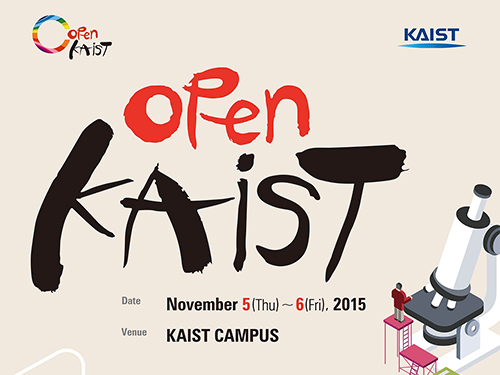 Open KAIST 2015
KAIST’s research environment and its most recent achievements were open to the public.
KAIST hosted “Open KAIST 2015” over two days from November 5-6, 2015 in which its 17 departments and three research centers were open to the public. The event is one of the largest events that KAIST holds, which permits such public viewings of its facilities. It is the eighth time it has taken place.
During this event, the departments and centers offered 64 programs including laboratory tours, research achievement exhibitions, department introductions, and special lectures.
The “Motion Capture System”of Professor Jun-Yong Noh’s lab (Graduate School of Culture Technology) drew particular attention.
The “Motion Capture System” expresses human and animal motion in three-dimensional (3D) space using infrared cameras and optic markers, which can then be applied to various industries such as movies, games, and animation. During the program, researchers themselves demonstrated the recording of the movement and its conversion into 3D characters.
Professor Yong-Hoon Cho’s laboratory introduced the scientific mechanism behind the Light Emitting Diode (LED) as well as its manufacturing process under the topic:“A to Z of LED Production.” The reserachers explained that how green LED is much more efficient compared to previous light sources and presented applications that how it is widely used in everyday life in smart phones, electronic displays, and other mobile gadgets.
Professor Jun-tani of the Department of Electronic and Electrical Engineering introduced “Humanoid Robot Nao’s Imitation of Human Motions.” Nao is an autonomous, programmable humanoid robot developed by a French robotics company based in Paris. Nao has an artificial neural circuit, which is the functional equivalent of a human brain, and can thus mimic the subject’s motions through learning.
In addition, Professor Hyo-Choong Bang (Department of Aerospace Engineering) in his lecture on “Unmanned Vehicle Research and Nano Satellites” and Professor Hyun Myung (Department of Civil and Environmental Engineering) on his lecture on “Future Civilization Robot System: the Jellyfish Elimination Robotic Swarm and the Wall-Climbing Drone” provided information on the progress of their respective research.
KAIST also displayed its most recent research achievements. A lecture on “Information Technology Convergence” offered a showroom for “Dr. M,” which is a mobile healthcare platform. Dr. M is a mobile healthcare system that collects and analyzes biosignals via a smart sensor attached to the human body that shows around 20 advanced technologies.
The Satellite Technology Research Center introduced the public to its “Get to Know Satellites” program on Korea’s first satellite “Our Star 1” in addition to showing the satellite assembly room and the satellite communication center.
Special lectures were also held for visitors. Professor Min-Hyuk Kim and Hye-Yeon Oh of the School of Computing talked about “Computer Graphics and Advanced Video Technology” and “Man and the Computer,” respectively, from the perspective of non-experts.
Another interesting feature was the “Wearable Computer Competition” in which college students held fashion shows with computers attached to their clothes.
Professor Jung Kwon Lee, the Dean of the College of Engineering, who led this event, said that “the Open KAIST, which is being held for the eighth time this year, is an excellent opportunity for the general public to experience KAIST’s research environment.” He hoped this could motivate young adults to widen their spectrum of scientific knowledge and raise affection for science.
2015.11.13 View 12594
Open KAIST 2015
KAIST’s research environment and its most recent achievements were open to the public.
KAIST hosted “Open KAIST 2015” over two days from November 5-6, 2015 in which its 17 departments and three research centers were open to the public. The event is one of the largest events that KAIST holds, which permits such public viewings of its facilities. It is the eighth time it has taken place.
During this event, the departments and centers offered 64 programs including laboratory tours, research achievement exhibitions, department introductions, and special lectures.
The “Motion Capture System”of Professor Jun-Yong Noh’s lab (Graduate School of Culture Technology) drew particular attention.
The “Motion Capture System” expresses human and animal motion in three-dimensional (3D) space using infrared cameras and optic markers, which can then be applied to various industries such as movies, games, and animation. During the program, researchers themselves demonstrated the recording of the movement and its conversion into 3D characters.
Professor Yong-Hoon Cho’s laboratory introduced the scientific mechanism behind the Light Emitting Diode (LED) as well as its manufacturing process under the topic:“A to Z of LED Production.” The reserachers explained that how green LED is much more efficient compared to previous light sources and presented applications that how it is widely used in everyday life in smart phones, electronic displays, and other mobile gadgets.
Professor Jun-tani of the Department of Electronic and Electrical Engineering introduced “Humanoid Robot Nao’s Imitation of Human Motions.” Nao is an autonomous, programmable humanoid robot developed by a French robotics company based in Paris. Nao has an artificial neural circuit, which is the functional equivalent of a human brain, and can thus mimic the subject’s motions through learning.
In addition, Professor Hyo-Choong Bang (Department of Aerospace Engineering) in his lecture on “Unmanned Vehicle Research and Nano Satellites” and Professor Hyun Myung (Department of Civil and Environmental Engineering) on his lecture on “Future Civilization Robot System: the Jellyfish Elimination Robotic Swarm and the Wall-Climbing Drone” provided information on the progress of their respective research.
KAIST also displayed its most recent research achievements. A lecture on “Information Technology Convergence” offered a showroom for “Dr. M,” which is a mobile healthcare platform. Dr. M is a mobile healthcare system that collects and analyzes biosignals via a smart sensor attached to the human body that shows around 20 advanced technologies.
The Satellite Technology Research Center introduced the public to its “Get to Know Satellites” program on Korea’s first satellite “Our Star 1” in addition to showing the satellite assembly room and the satellite communication center.
Special lectures were also held for visitors. Professor Min-Hyuk Kim and Hye-Yeon Oh of the School of Computing talked about “Computer Graphics and Advanced Video Technology” and “Man and the Computer,” respectively, from the perspective of non-experts.
Another interesting feature was the “Wearable Computer Competition” in which college students held fashion shows with computers attached to their clothes.
Professor Jung Kwon Lee, the Dean of the College of Engineering, who led this event, said that “the Open KAIST, which is being held for the eighth time this year, is an excellent opportunity for the general public to experience KAIST’s research environment.” He hoped this could motivate young adults to widen their spectrum of scientific knowledge and raise affection for science.
2015.11.13 View 12594 -
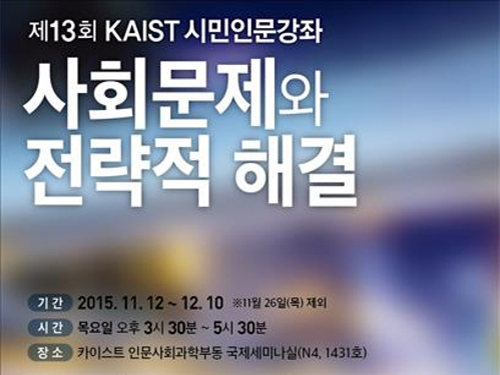 Public Lectures by KAIST's Humanities and Social Sciences Research Center
The Humanities and Social Sciences Research Center at KAIST offers public lectures at the International Seminar Hall of the Humanities and Social Sciences building on campus from November 12, 2015 to December 10, 2015. There will be four lectures, all of which will be available in Korean only.
The theme of the lectures is “social issues and strategic solutions.” Experts in various fields including women’s studies, criminal psychology, Go (a Chinese board game) and its philosophy, and Korean studies will participate, offering multifaceted analysis and solutions for social issues in Korea.
Joo-Hee Kim, a researcher at the Korean Women’s Institute of Ewha Women’s University, will lecture on “Problems of Loan Products Exclusively for Women” and discuss the background of "micro-loans" which are often targeted at women, while evaluating the logic of financial corporations behind marketing such products.
Lectures by Professor Ji-Sun Park from the Department of Social Psychology at Ewha Women’s University on “Understanding of Criminal Psychology from Letters,” Professor Soo-Hyun Jeong from the Department of Go at Myeongji University on “Life Lessons and Strategies from Playing Go,” and Professor Seung-Taek Ahn from Kyujanggak Institute for Korean Studies of Seoul National University on “Community Problems in Folk Culture” will follow.
The organizer of the lectures, Professor Jung-Hoon Kim of the Department of Humanities and Social Sciences at KAIST said,
“These lectures will provide local citizens and the KAIST family a wonderful opportunity to understand important social issues from the perspective of social science. It will also serve as a valuable time to think about how our social conflicts could differ from those of other countries, helping us to find solutions.”
To register for these free lectures, go to http://hss.kaist.ac.kr by November 9, 2015.
2015.11.06 View 7867
Public Lectures by KAIST's Humanities and Social Sciences Research Center
The Humanities and Social Sciences Research Center at KAIST offers public lectures at the International Seminar Hall of the Humanities and Social Sciences building on campus from November 12, 2015 to December 10, 2015. There will be four lectures, all of which will be available in Korean only.
The theme of the lectures is “social issues and strategic solutions.” Experts in various fields including women’s studies, criminal psychology, Go (a Chinese board game) and its philosophy, and Korean studies will participate, offering multifaceted analysis and solutions for social issues in Korea.
Joo-Hee Kim, a researcher at the Korean Women’s Institute of Ewha Women’s University, will lecture on “Problems of Loan Products Exclusively for Women” and discuss the background of "micro-loans" which are often targeted at women, while evaluating the logic of financial corporations behind marketing such products.
Lectures by Professor Ji-Sun Park from the Department of Social Psychology at Ewha Women’s University on “Understanding of Criminal Psychology from Letters,” Professor Soo-Hyun Jeong from the Department of Go at Myeongji University on “Life Lessons and Strategies from Playing Go,” and Professor Seung-Taek Ahn from Kyujanggak Institute for Korean Studies of Seoul National University on “Community Problems in Folk Culture” will follow.
The organizer of the lectures, Professor Jung-Hoon Kim of the Department of Humanities and Social Sciences at KAIST said,
“These lectures will provide local citizens and the KAIST family a wonderful opportunity to understand important social issues from the perspective of social science. It will also serve as a valuable time to think about how our social conflicts could differ from those of other countries, helping us to find solutions.”
To register for these free lectures, go to http://hss.kaist.ac.kr by November 9, 2015.
2015.11.06 View 7867 -
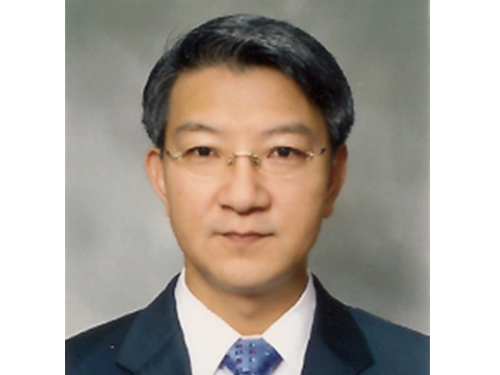 Distinguished Professor Sang Yup Lee Gives Special Lecture at Tianjin University, China
Distinguished Professor Sang Yup Lee from the Department of Chemical and Biomolecular Engineering at KAIST gave a special lecture at Tianjin University, China, on September 12, 2014.
The university has invited prestigious scholars and scientists including Nobel Prize laureates from all around the world to their program called the "BeiYang Lecture Series."
Professor Lee said:
"The lecture series has invited many eminent global leaders such as Dr. Steven Chu, who received the Nobel Prize in Physics in 1997 and also served the 12th United States Secretary of Energy. It is a great honor to participate in the program as a speaker. The university told me that in recognition of my research in the development of sustainable biochemical industry through systems metabolic engineering, I was invited to speak.”
Professor Lee presented his speech entitled “Production of Chemical Materials through Microorganism Metabolic Systems Engineering” and took questions from the audience.
Professor Lee developed the world’s most efficient microorganism and bioprocess such as succinate, butanol, and engineering plastic raw materials. In recent years, he has succeeded in producing a small quantity of gasoline through converting in-vivo generated fatty acids.
2014.09.16 View 10492
Distinguished Professor Sang Yup Lee Gives Special Lecture at Tianjin University, China
Distinguished Professor Sang Yup Lee from the Department of Chemical and Biomolecular Engineering at KAIST gave a special lecture at Tianjin University, China, on September 12, 2014.
The university has invited prestigious scholars and scientists including Nobel Prize laureates from all around the world to their program called the "BeiYang Lecture Series."
Professor Lee said:
"The lecture series has invited many eminent global leaders such as Dr. Steven Chu, who received the Nobel Prize in Physics in 1997 and also served the 12th United States Secretary of Energy. It is a great honor to participate in the program as a speaker. The university told me that in recognition of my research in the development of sustainable biochemical industry through systems metabolic engineering, I was invited to speak.”
Professor Lee presented his speech entitled “Production of Chemical Materials through Microorganism Metabolic Systems Engineering” and took questions from the audience.
Professor Lee developed the world’s most efficient microorganism and bioprocess such as succinate, butanol, and engineering plastic raw materials. In recent years, he has succeeded in producing a small quantity of gasoline through converting in-vivo generated fatty acids.
2014.09.16 View 10492 -
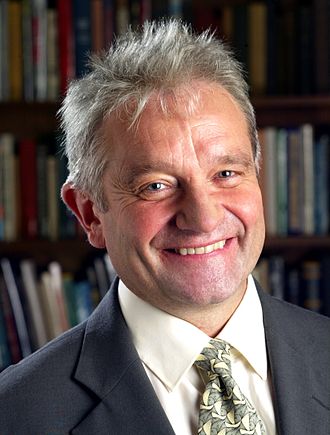 Visit by Sir Paul Maxime Nurse, President of the Royal Society
Sir Paul Maxime
Nurse, who is an English geneticist and cell biologist, visited KAIST and gave
a lecture entitled The Great Ideas of
Biology on March 11, 2014.
Sir Paul was awarded the 2001 Nobel Prize in
Physiology or Medicine with Leland H. Hartwell and R. Timothy Hunt for their discoveries
of protein molecules that control the division of cells in the cell cycle.
He was Professor of Microbiology at the University
of Oxford, CEO of the Imperial Cancer Research Fund and Cancer Research UK, and
President of Rockefeller University in New York. Sir Paul is currently the President of
the Royal Society as well as Director and Chief Executive of the Francis Crick
Institute.
Founded in London in 1660, the Royal Society is composed of the world’s most distinguished scientists drawn from all areas of
science, engineering, and medicine.
Below is a summary of his lecture, The Great Ideas of Biology:
Four major ideas of biology
are the theory of genes, evolution by natural selection, the proposal that the
cell is the fundamental unit of all life, and the chemical composition of a cell.
When considering the
question “what is life?” these ideas come together. The special way cells reproduce
provides the conditions by which natural selection takes place, allowing living
organisms to evolve. The organization of chemistry within the cell provides
explanations for life’s phenomena.
In addition, an emerging idea
is the nature of biological self-organization with which living cells and organisms
process information and acquire specific forms. These great ideas have
influenced one another and changed the way we perceive biology and science
today.
2014.03.11 View 11953
Visit by Sir Paul Maxime Nurse, President of the Royal Society
Sir Paul Maxime
Nurse, who is an English geneticist and cell biologist, visited KAIST and gave
a lecture entitled The Great Ideas of
Biology on March 11, 2014.
Sir Paul was awarded the 2001 Nobel Prize in
Physiology or Medicine with Leland H. Hartwell and R. Timothy Hunt for their discoveries
of protein molecules that control the division of cells in the cell cycle.
He was Professor of Microbiology at the University
of Oxford, CEO of the Imperial Cancer Research Fund and Cancer Research UK, and
President of Rockefeller University in New York. Sir Paul is currently the President of
the Royal Society as well as Director and Chief Executive of the Francis Crick
Institute.
Founded in London in 1660, the Royal Society is composed of the world’s most distinguished scientists drawn from all areas of
science, engineering, and medicine.
Below is a summary of his lecture, The Great Ideas of Biology:
Four major ideas of biology
are the theory of genes, evolution by natural selection, the proposal that the
cell is the fundamental unit of all life, and the chemical composition of a cell.
When considering the
question “what is life?” these ideas come together. The special way cells reproduce
provides the conditions by which natural selection takes place, allowing living
organisms to evolve. The organization of chemistry within the cell provides
explanations for life’s phenomena.
In addition, an emerging idea
is the nature of biological self-organization with which living cells and organisms
process information and acquire specific forms. These great ideas have
influenced one another and changed the way we perceive biology and science
today.
2014.03.11 View 11953 -
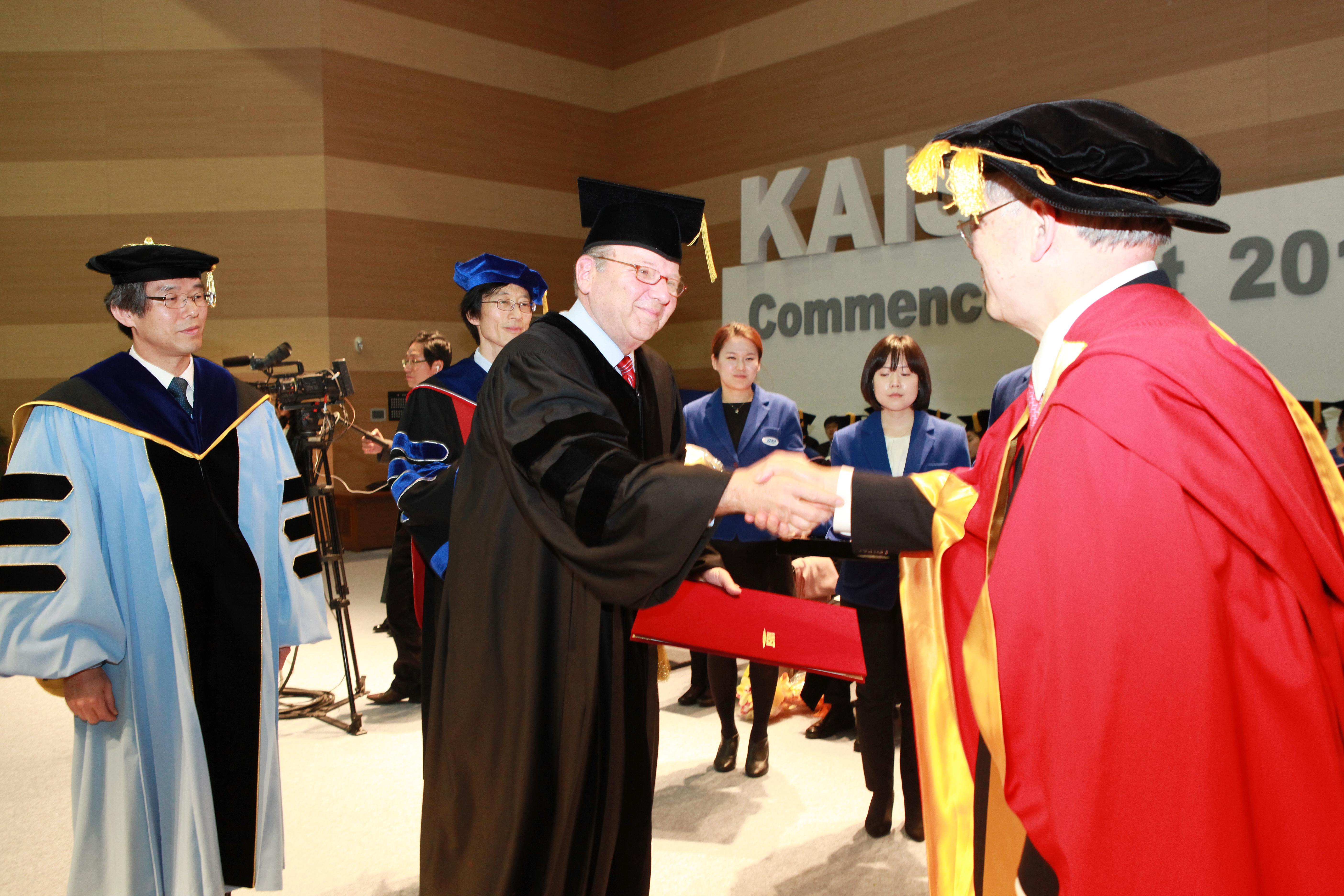 KAIST Confers Honorary Degree to CMU President Cohon
By DongJae Lee
The KAIST Herald Staff Reporter
On February 24, Dr. Jared L. Cohon, President of Carnegie Mellon University (CMU), visited KAIST to receive an honorary degree in science and technology and gave a lecture to the university’s students. Dr. Cohon is the eighth president of CMU and has held numerous other public and university positions. During his presidency, CMU has expanded globally and now takes part in joint programs around the world, including those with universities in Korea, Australia, India and Qatar. KAIST and CMU have been collaborating since 2005 in research projects, student and faculty exchange and dual degree programs. Before the 2012 Commencement Ceremony, Dr. Cohon met with The KAIST Herald and other news agencies for an interview.
The interview started with Dr. Cohon giving a brief introduction of CMU. Like KAIST, CMU has a small but special composition and is dedicated to science and technology as well as business and the fine arts. CMU, founded in 1900, is also relatively young by US standards but has nonetheless grown into a world-class university. The power behind this rapid growth can be expressed by four key values: innovation and change, problem-solving, interdisciplinary cooperation, and hard work. The slogan “My heart is in the work” clearly expresses the values of CMU.
One interesting aspect of CMU is its fine arts and business fields. While CMU is dedicated to science and technology, it also has many respected alumni in the aforementioned fields including Andy Warhol, a leading figure in pop art, and Randy Pausch, the author of The Last Lecture. CMU alumni have together won 6 Academy Awards, 22 Emmy Awards, over 100 Tony Awards and 20 Nobel Prizes.
Regarding CMU’s joint projects with KAIST, as well as student and faculty exchanges, Dr. Cohon mentioned joint Ph.D. programs in Civil and Environmental Engineering and Mechanical Engineering and a joint Master’s program in Software Engineering. Currently, the Civil and Environmental Engineering joint Ph.D. program has one participant and the Software Technology Institute joint Master of Software Engineering program has 6 participants.
Dr. Cohon mentioned that receiving an honorary degree in KAIST is a tremendous honor and that he is grateful to be recognized by such a wonderful university like KAIST.
2012.03.23 View 11657
KAIST Confers Honorary Degree to CMU President Cohon
By DongJae Lee
The KAIST Herald Staff Reporter
On February 24, Dr. Jared L. Cohon, President of Carnegie Mellon University (CMU), visited KAIST to receive an honorary degree in science and technology and gave a lecture to the university’s students. Dr. Cohon is the eighth president of CMU and has held numerous other public and university positions. During his presidency, CMU has expanded globally and now takes part in joint programs around the world, including those with universities in Korea, Australia, India and Qatar. KAIST and CMU have been collaborating since 2005 in research projects, student and faculty exchange and dual degree programs. Before the 2012 Commencement Ceremony, Dr. Cohon met with The KAIST Herald and other news agencies for an interview.
The interview started with Dr. Cohon giving a brief introduction of CMU. Like KAIST, CMU has a small but special composition and is dedicated to science and technology as well as business and the fine arts. CMU, founded in 1900, is also relatively young by US standards but has nonetheless grown into a world-class university. The power behind this rapid growth can be expressed by four key values: innovation and change, problem-solving, interdisciplinary cooperation, and hard work. The slogan “My heart is in the work” clearly expresses the values of CMU.
One interesting aspect of CMU is its fine arts and business fields. While CMU is dedicated to science and technology, it also has many respected alumni in the aforementioned fields including Andy Warhol, a leading figure in pop art, and Randy Pausch, the author of The Last Lecture. CMU alumni have together won 6 Academy Awards, 22 Emmy Awards, over 100 Tony Awards and 20 Nobel Prizes.
Regarding CMU’s joint projects with KAIST, as well as student and faculty exchanges, Dr. Cohon mentioned joint Ph.D. programs in Civil and Environmental Engineering and Mechanical Engineering and a joint Master’s program in Software Engineering. Currently, the Civil and Environmental Engineering joint Ph.D. program has one participant and the Software Technology Institute joint Master of Software Engineering program has 6 participants.
Dr. Cohon mentioned that receiving an honorary degree in KAIST is a tremendous honor and that he is grateful to be recognized by such a wonderful university like KAIST.
2012.03.23 View 11657 -
 Lee Kang Gook Chief of Constitutional Court gives Lecture at KAIST
Chief of Constitutional Court Lee Kang Gook (66) gave a lecture on the 29th of April in Turman Hall on the topic of “Constitutional Trial: the Present and the Future”.
Chief Lee graduated from Seoul National University’s College of Law and was sworn into Chief of Constitutional Court on January of 2007.
He gave a lecture to those students enrolled in Leadership Program which is a program that aims at broadening the perspective and thought of KAIST students.
2011.05.11 View 8316
Lee Kang Gook Chief of Constitutional Court gives Lecture at KAIST
Chief of Constitutional Court Lee Kang Gook (66) gave a lecture on the 29th of April in Turman Hall on the topic of “Constitutional Trial: the Present and the Future”.
Chief Lee graduated from Seoul National University’s College of Law and was sworn into Chief of Constitutional Court on January of 2007.
He gave a lecture to those students enrolled in Leadership Program which is a program that aims at broadening the perspective and thought of KAIST students.
2011.05.11 View 8316 -
 Oh Myung Chairman of the Board gives Special Lecture in the S+ Convergence AMP Program
Chairman Oh Myung (CEO of Woong Jin Energy Poly Silicon) gave a special lecture in the KAIST S+ Convergence AMP Program with the topic of ’Dream of a Korea 30 years into the future’.
Chairman Oh insisted to the program attendees that they do their best in developing Korea through development of new technology and IT and that he considers education and development of new technology as the reason for Korea’s rapid development.
The program invites a guest speaker every month, apart from the planed lectures. The guest speakers were the top of their respective fields. In addition, various activities like riding the OLEV or domestic workshops or educational trips abroad imparted the ability to take on a global perspective.
2011.05.11 View 9748
Oh Myung Chairman of the Board gives Special Lecture in the S+ Convergence AMP Program
Chairman Oh Myung (CEO of Woong Jin Energy Poly Silicon) gave a special lecture in the KAIST S+ Convergence AMP Program with the topic of ’Dream of a Korea 30 years into the future’.
Chairman Oh insisted to the program attendees that they do their best in developing Korea through development of new technology and IT and that he considers education and development of new technology as the reason for Korea’s rapid development.
The program invites a guest speaker every month, apart from the planed lectures. The guest speakers were the top of their respective fields. In addition, various activities like riding the OLEV or domestic workshops or educational trips abroad imparted the ability to take on a global perspective.
2011.05.11 View 9748 -
 TEAK: New Multimedia Site kaistube.org Offers Lectures on English
For those wanting an experience of KAIST from an entirely new perspective, there is some good news. The new multimedia website, kaistube.org is available for browsing with better and newer content.
The website, kaistube.org, is a “Creative media in English by the students of KAIST” and was created with aims to introduce university life from the perspective of the very components that makes KAIST, KAIST; its students.
The website features photos the students took and short films they created about KAIST and of KAIST. It can be said that kaistube.org is fast becoming the creative hub and outlet for students at KAIST to express their creative personalities. Students at KAIST or anywhere else for that matter should not be restricted to just academic activities, which make kaistube.org so meaningful.
One great service that can be found at kaistube.org is the TEAK (Teaching English at KAIST). TEAK is a weekly show created and hosted by Visiting Professors Tim Thompson and Don Rikley and serves to provide education in presentation skills and writing skills in English. Season one focused on academic writing and Season two will focus on academic speaking and presentation skills.
The importance of clear communications skills via presentations or writing format in English has become ever important in this era of globalization. The lectures provided for at kaistube.org is a great resource and guide that will aid not only the family members at KAIST, but to any and all non-KAISTians who wish to strengthen their grasp on the English language.
The podcasts can be downloaded onto the computer for transfer to a portable music player, like the iPod or the iPhone, and can be even downloaded from the iTunes.
2011.04.02 View 11082
TEAK: New Multimedia Site kaistube.org Offers Lectures on English
For those wanting an experience of KAIST from an entirely new perspective, there is some good news. The new multimedia website, kaistube.org is available for browsing with better and newer content.
The website, kaistube.org, is a “Creative media in English by the students of KAIST” and was created with aims to introduce university life from the perspective of the very components that makes KAIST, KAIST; its students.
The website features photos the students took and short films they created about KAIST and of KAIST. It can be said that kaistube.org is fast becoming the creative hub and outlet for students at KAIST to express their creative personalities. Students at KAIST or anywhere else for that matter should not be restricted to just academic activities, which make kaistube.org so meaningful.
One great service that can be found at kaistube.org is the TEAK (Teaching English at KAIST). TEAK is a weekly show created and hosted by Visiting Professors Tim Thompson and Don Rikley and serves to provide education in presentation skills and writing skills in English. Season one focused on academic writing and Season two will focus on academic speaking and presentation skills.
The importance of clear communications skills via presentations or writing format in English has become ever important in this era of globalization. The lectures provided for at kaistube.org is a great resource and guide that will aid not only the family members at KAIST, but to any and all non-KAISTians who wish to strengthen their grasp on the English language.
The podcasts can be downloaded onto the computer for transfer to a portable music player, like the iPod or the iPhone, and can be even downloaded from the iTunes.
2011.04.02 View 11082 -
 The 40th Anniversary of the Establishment of KAIST Commemoration Held
KAIST, aspiring to become the best Science and Technology University, has turned 40.
KAIST held the commemoration ceremony for the 40th Anniversary of the Establishment of KAIST in the auditorium.
Five awards (Scholar, Creative Lecture, Excellence in Lecture, International Cooperation, Experiment) were given to Professors Kim Eun Jun and Walton Jones (department of Biology), Professor Abigail Shin (department of Humanities and Social Sciences), Professor Shin Seong Chul (department of Physics), and Professor Lee Sang Yeop (department of Biological Chemical Engineering). Each recipient received a prize of five million won.
Professor Song Joon Hwa (department of Computer Sciences) received the ‘New Knowledge Award’ in recognition of his development of the Orchestrator Mobile platform. The new platform is different from Android or the IOS platform in that it allows a fluid relationship to be formed between the smartphone and the user.
KAIST also showed off its new emblem.
The emblem consists of a star which represents the KAIST’s goals of becoming the world leader, of training leaders, the center point, and hope. The main keywords are: ‘Leadership’, ‘Premium’, ‘Scientific’, and ‘Humanity’.
KAIST plans on having various events from May 9th when there will be the Vision Declaration.
2011.02.21 View 17191
The 40th Anniversary of the Establishment of KAIST Commemoration Held
KAIST, aspiring to become the best Science and Technology University, has turned 40.
KAIST held the commemoration ceremony for the 40th Anniversary of the Establishment of KAIST in the auditorium.
Five awards (Scholar, Creative Lecture, Excellence in Lecture, International Cooperation, Experiment) were given to Professors Kim Eun Jun and Walton Jones (department of Biology), Professor Abigail Shin (department of Humanities and Social Sciences), Professor Shin Seong Chul (department of Physics), and Professor Lee Sang Yeop (department of Biological Chemical Engineering). Each recipient received a prize of five million won.
Professor Song Joon Hwa (department of Computer Sciences) received the ‘New Knowledge Award’ in recognition of his development of the Orchestrator Mobile platform. The new platform is different from Android or the IOS platform in that it allows a fluid relationship to be formed between the smartphone and the user.
KAIST also showed off its new emblem.
The emblem consists of a star which represents the KAIST’s goals of becoming the world leader, of training leaders, the center point, and hope. The main keywords are: ‘Leadership’, ‘Premium’, ‘Scientific’, and ‘Humanity’.
KAIST plans on having various events from May 9th when there will be the Vision Declaration.
2011.02.21 View 17191 -
 Reasons for Hope: Jane Goodall Lectured at KAIST
Dr. Jane Goodall, globally acknowledged chimpanzee researcher and environmental activist, was invited to KAIST and gave a lecture on the importance of preservation and restoration of the ecosystem on the earth. The lecture took place on the 28 of September at the university’s auditorium from 5PM to 7PM.
The lecture, titled “Reasons for Hope: Celebrating 50 Years of Chimpanzee Research,” was organized to celebrate her longtime career as a primatologist and anthropologist.
The visiting of Dr. Jane Goodall, who had dedicated a long period of time in spreading the significance of the diversity of life, gave a meaningful opportunity to increase the Korean public’s awareness of life’s diversity.
This lecture was jointly sponsored by Ehwa Woman’s University and KAIST, and the lecture was translated by Professor Choi Jae-Chun of Ehwa University.
2010.09.29 View 10623
Reasons for Hope: Jane Goodall Lectured at KAIST
Dr. Jane Goodall, globally acknowledged chimpanzee researcher and environmental activist, was invited to KAIST and gave a lecture on the importance of preservation and restoration of the ecosystem on the earth. The lecture took place on the 28 of September at the university’s auditorium from 5PM to 7PM.
The lecture, titled “Reasons for Hope: Celebrating 50 Years of Chimpanzee Research,” was organized to celebrate her longtime career as a primatologist and anthropologist.
The visiting of Dr. Jane Goodall, who had dedicated a long period of time in spreading the significance of the diversity of life, gave a meaningful opportunity to increase the Korean public’s awareness of life’s diversity.
This lecture was jointly sponsored by Ehwa Woman’s University and KAIST, and the lecture was translated by Professor Choi Jae-Chun of Ehwa University.
2010.09.29 View 10623 -
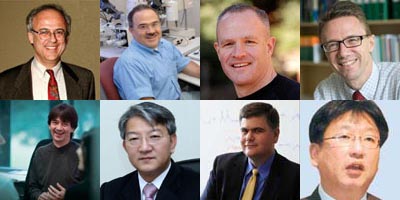 The 8th International Conference on Metabolic Engineering was held on June 13-18, 2010 in Jeju Island, South Korea.
From left to right, top row: Distinguished Professor and the conference chair Sang Yup Lee, Sang-Hyup Kim - Secretary to the President of Korea, Dr. Jay Keasling, Dr. Greg Stephanopoulos. Left to right, bottom row: Dr. William Provine, Dr. Terry Papoutsakis, Dr, Jens Nielsen, Dr. Lars Nielsen.
The importance of industrial biotechnology that produces chemicals and materials from renewable biomass is increasing due to climate change and the dearth of natural resources. Industrial biotechnology refers to a technology that allows sustainable bio-based production of chemicals and materials that could enrich human"s lives using microorganisms. This is where metabolic engineering comes into play for successful application of microorganisms, in which they are engineered in our intended way for improved production capability.
The 8th International Conference on Metabolic Engineering, the longest running conference of its kind, was held on June 13-18, 2010 at the International Convention Center in Jeju Island, South Korea. Distinguished Professor Sang Yup Lee of KAIST, Dean of College of Life Science and Bioengineering and Co-Director of Institute for the BioCentury, chaired the conference with the main theme of "metabolic engineering for green growth."
With 300 delegates selected by the committee, papers on production of biofuels, chemicals, biopolymers, and pharmaceutics and the development of fundamental metabolic engineering techniques were presented at the conference along with examples of successful commercialization of products developed by several global companies.
Sang Hyup Kim, Secretary to the President of Korea, gave an opening plenary lecture entitled "Korean green growth initiative," to inform experts from around the globe of the leadership on green growth in Korea. Young Hoon Park, President of Korea Research Institute of Bioscience and Biotechnology (KRIBB, Korea) delivered his congratulatory address.
Sang Hyup Kim said, "Hosting an international conference in Korea on metabolic engineering, which forms a core technology necessary for the development of environmentally friendly processes for producing chemicals and biofuels from renewable biomass, is very meaningful as green growth is a big issue around the globe. This is a great chance to show the excellence of Korea"s green growth associated technology to experts in metabolic engineering and industrial biotechnology."
A total of 47 invited lectures in this conference included recent and important topics, for instance, "Synthetic biology for synthetic fuels" by Dr. Jay Keasling from the Joint BioEnergy Institute (USA), "Microbial oil production from renewable feedstocks" by Dr. Greg Stephanopoulos from MIT (USA), "Yeast as a platform cell factory for production of fuels and chemicals" by Dr. Jens Nielsen from Chalmers University (Sweden), "Mammalian synthetic biology - from tools to therapies" by Dr. Martin Fussengger from ETH (Switzerland), "Building, modeling, and applications of metabolic and transcriptional regulatory networks at a genome-scale" by Dr. Bernhard Palsson from the University of California - San Diego (USA), "Genome analysis and engineering Eschericha coli for sucrose utilization" by Dr. Lars Nielsen from the University of Queensland (Australia), "Artificial microorganisms by synthetic biology" by Dr. Daniel Gibson from JCVI (USA), and "Metabolomics and its applications" by Dr. Masaru Tomita from Keio University (Japan). From Korea, Dr. Jin Hwan Park from the research group of Dr. Sang Yup Lee at KAIST presented "Systems metabolic engineering of Escherichia coli for amino acid production," and Dr. Ji Hyun Kim from KRIBB presented "Genome sequencing and omics systems analysis of the protein cell factory of Escherichia coli".
Global companies involved in biorefinery presented their recent research outcomes with emphasis on commercialized technologies. They included "Metabolic and process engineering for commercial outcomes" by Dr. William Provine from DuPont (USA), "Direct production of 1,4-butanediol from renewable feedstocks" by Dr. Mark Burk from Genomatica (USA), "Development of an economically sustainable bioprocess for the production of bio 1,2-propanediol" by Dr. Francis Voelker from Metabolic Explorer (France), "Biotechnology to the bottom-line: low pH lactic acid production at industrial scale" by Dr. Pirkko Suominen from Cargill (USA), "Bioisoprene™: traditional monomer, traditional chemistry, sustainable source" by Dr. Gregg Whited from Danisco (USA) and "Efficient production of pharmaceuticals by engineered fungi" by Dr. Roel Bovenberg from DSM (Netherlands).
This biennial conference also presented the International Metabolic Engineering Award (expanded version of the previous Merck Metabolic Engineering Award) to the best metabolic engineer in the world. The 2010 International Metabolic Engineering Award went to Dr. E. Terry Papoutsakis from the University of Delaware (USA) who has contributed to the production of biobutanol through the metabolic engineering of Clostridia in the last three decades, and he gave an award lecture. Dr. Sang Yup Lee, the current chair of the upcoming conference, was the previous recipient of this award at the last metabolic engineering conference in 2008.
In addition to the invited lectures, a total of 156 carefully selected poster papers were chosen for presentation, and awards were presented to the best posters after rigorous review by the committee members. Such awards included "The 2010 Metabolic Engineering Best Poster Award" and the "2010 Young Metabolic Engineer Award" from the Metabolic Engineering conference, and prestigious international journal awards, including "Wiley Biotechnology Journal Best Poster Award", "Wiley Biotechnology and Bioengineering Best Poster Award" and "Elsevier Metabolic Engineering Best Paper Award." Dr. Catherine Goodman, a senior editor of Nature Chemical Biology, also presented the "Nature Chemical Biology Best Poster Award on Metabolic Engineering."
Regarding this conference, Dr. Sang Yup Lee, the conference chair, said, "This conference is the best international conference in the field of metabolic engineering, which is held every two years, and Korea is the first Asian country to host it. All the experts and students spend time together from early breakfast to late poster sessions, which is a distinct feature of this conference. Although the number of delegates had typically been limited to 200, around 300 delegates were selected this year to accept more attendees from many people who have been interested in metabolic engineering. Also, it is very fitting that "green growth" is the main topic of this conference because Korea is playing a key role in this field. I"m grateful to the Lotte Scholarship Foundation, COFCO, GS Caltex, Bioneer, US DOE, US NSF, Daesang, CJ Cheiljedang, Genomatica and DuPont who provided us with generous financial support that allowed the successful organization of this conference."
The conference was organized by the Systems Biology Research Project Team supported by the Ministry of Eduction, Science and Technology (MEST), Microbial Frontier Research Project Group, World Class University Project Group at KAIST, Institute for the BioCentury at KAIST, Korean Society for Biotechnology and Bioengineering, and the Engineering Conference International (ECI) of the United States.
Inquiries: Professor Sang Yup Lee (+82-42-350-3930), industrialbio@gmail.com
2010.06.25 View 21746
The 8th International Conference on Metabolic Engineering was held on June 13-18, 2010 in Jeju Island, South Korea.
From left to right, top row: Distinguished Professor and the conference chair Sang Yup Lee, Sang-Hyup Kim - Secretary to the President of Korea, Dr. Jay Keasling, Dr. Greg Stephanopoulos. Left to right, bottom row: Dr. William Provine, Dr. Terry Papoutsakis, Dr, Jens Nielsen, Dr. Lars Nielsen.
The importance of industrial biotechnology that produces chemicals and materials from renewable biomass is increasing due to climate change and the dearth of natural resources. Industrial biotechnology refers to a technology that allows sustainable bio-based production of chemicals and materials that could enrich human"s lives using microorganisms. This is where metabolic engineering comes into play for successful application of microorganisms, in which they are engineered in our intended way for improved production capability.
The 8th International Conference on Metabolic Engineering, the longest running conference of its kind, was held on June 13-18, 2010 at the International Convention Center in Jeju Island, South Korea. Distinguished Professor Sang Yup Lee of KAIST, Dean of College of Life Science and Bioengineering and Co-Director of Institute for the BioCentury, chaired the conference with the main theme of "metabolic engineering for green growth."
With 300 delegates selected by the committee, papers on production of biofuels, chemicals, biopolymers, and pharmaceutics and the development of fundamental metabolic engineering techniques were presented at the conference along with examples of successful commercialization of products developed by several global companies.
Sang Hyup Kim, Secretary to the President of Korea, gave an opening plenary lecture entitled "Korean green growth initiative," to inform experts from around the globe of the leadership on green growth in Korea. Young Hoon Park, President of Korea Research Institute of Bioscience and Biotechnology (KRIBB, Korea) delivered his congratulatory address.
Sang Hyup Kim said, "Hosting an international conference in Korea on metabolic engineering, which forms a core technology necessary for the development of environmentally friendly processes for producing chemicals and biofuels from renewable biomass, is very meaningful as green growth is a big issue around the globe. This is a great chance to show the excellence of Korea"s green growth associated technology to experts in metabolic engineering and industrial biotechnology."
A total of 47 invited lectures in this conference included recent and important topics, for instance, "Synthetic biology for synthetic fuels" by Dr. Jay Keasling from the Joint BioEnergy Institute (USA), "Microbial oil production from renewable feedstocks" by Dr. Greg Stephanopoulos from MIT (USA), "Yeast as a platform cell factory for production of fuels and chemicals" by Dr. Jens Nielsen from Chalmers University (Sweden), "Mammalian synthetic biology - from tools to therapies" by Dr. Martin Fussengger from ETH (Switzerland), "Building, modeling, and applications of metabolic and transcriptional regulatory networks at a genome-scale" by Dr. Bernhard Palsson from the University of California - San Diego (USA), "Genome analysis and engineering Eschericha coli for sucrose utilization" by Dr. Lars Nielsen from the University of Queensland (Australia), "Artificial microorganisms by synthetic biology" by Dr. Daniel Gibson from JCVI (USA), and "Metabolomics and its applications" by Dr. Masaru Tomita from Keio University (Japan). From Korea, Dr. Jin Hwan Park from the research group of Dr. Sang Yup Lee at KAIST presented "Systems metabolic engineering of Escherichia coli for amino acid production," and Dr. Ji Hyun Kim from KRIBB presented "Genome sequencing and omics systems analysis of the protein cell factory of Escherichia coli".
Global companies involved in biorefinery presented their recent research outcomes with emphasis on commercialized technologies. They included "Metabolic and process engineering for commercial outcomes" by Dr. William Provine from DuPont (USA), "Direct production of 1,4-butanediol from renewable feedstocks" by Dr. Mark Burk from Genomatica (USA), "Development of an economically sustainable bioprocess for the production of bio 1,2-propanediol" by Dr. Francis Voelker from Metabolic Explorer (France), "Biotechnology to the bottom-line: low pH lactic acid production at industrial scale" by Dr. Pirkko Suominen from Cargill (USA), "Bioisoprene™: traditional monomer, traditional chemistry, sustainable source" by Dr. Gregg Whited from Danisco (USA) and "Efficient production of pharmaceuticals by engineered fungi" by Dr. Roel Bovenberg from DSM (Netherlands).
This biennial conference also presented the International Metabolic Engineering Award (expanded version of the previous Merck Metabolic Engineering Award) to the best metabolic engineer in the world. The 2010 International Metabolic Engineering Award went to Dr. E. Terry Papoutsakis from the University of Delaware (USA) who has contributed to the production of biobutanol through the metabolic engineering of Clostridia in the last three decades, and he gave an award lecture. Dr. Sang Yup Lee, the current chair of the upcoming conference, was the previous recipient of this award at the last metabolic engineering conference in 2008.
In addition to the invited lectures, a total of 156 carefully selected poster papers were chosen for presentation, and awards were presented to the best posters after rigorous review by the committee members. Such awards included "The 2010 Metabolic Engineering Best Poster Award" and the "2010 Young Metabolic Engineer Award" from the Metabolic Engineering conference, and prestigious international journal awards, including "Wiley Biotechnology Journal Best Poster Award", "Wiley Biotechnology and Bioengineering Best Poster Award" and "Elsevier Metabolic Engineering Best Paper Award." Dr. Catherine Goodman, a senior editor of Nature Chemical Biology, also presented the "Nature Chemical Biology Best Poster Award on Metabolic Engineering."
Regarding this conference, Dr. Sang Yup Lee, the conference chair, said, "This conference is the best international conference in the field of metabolic engineering, which is held every two years, and Korea is the first Asian country to host it. All the experts and students spend time together from early breakfast to late poster sessions, which is a distinct feature of this conference. Although the number of delegates had typically been limited to 200, around 300 delegates were selected this year to accept more attendees from many people who have been interested in metabolic engineering. Also, it is very fitting that "green growth" is the main topic of this conference because Korea is playing a key role in this field. I"m grateful to the Lotte Scholarship Foundation, COFCO, GS Caltex, Bioneer, US DOE, US NSF, Daesang, CJ Cheiljedang, Genomatica and DuPont who provided us with generous financial support that allowed the successful organization of this conference."
The conference was organized by the Systems Biology Research Project Team supported by the Ministry of Eduction, Science and Technology (MEST), Microbial Frontier Research Project Group, World Class University Project Group at KAIST, Institute for the BioCentury at KAIST, Korean Society for Biotechnology and Bioengineering, and the Engineering Conference International (ECI) of the United States.
Inquiries: Professor Sang Yup Lee (+82-42-350-3930), industrialbio@gmail.com
2010.06.25 View 21746